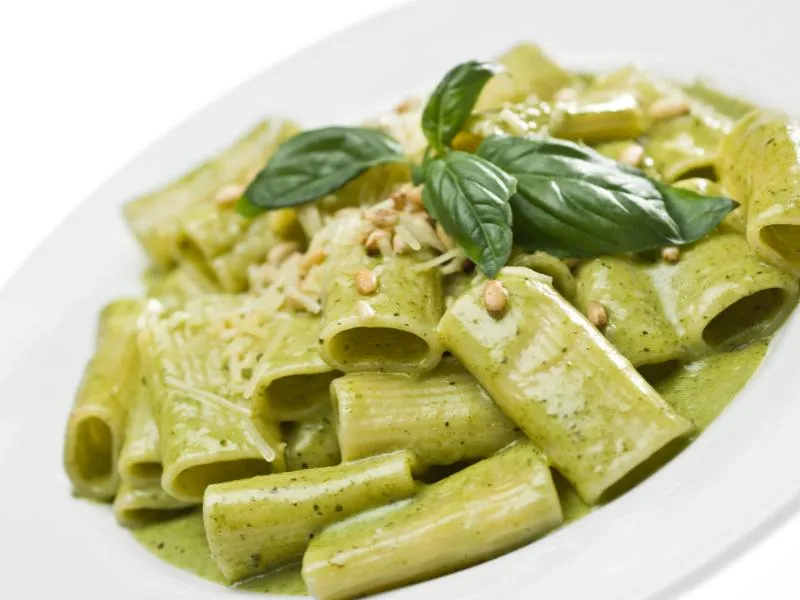Pasta alla Genovese
Fresh pasta tossed with authentic Ligurian basil pesto, potatoes, and green beans.
👉 View Authentic Recipe 👈
About This Dish
Pasta alla Genovese is the quintessential dish of Liguria, originating in Genoa (Genova), the region’s capital city. The authentic version combines fresh pasta with the region’s world-famous basil pesto, cubed potatoes, and tender green beans to create a harmonious blend of flavors and textures that epitomizes Ligurian coastal cuisine.
The star of this dish is genuine Pesto alla Genovese, made with young, small-leaved Ligurian basil (preferably from Prà, a neighborhood of Genoa known for its superior basil), pine nuts, garlic, aged Parmigiano-Reggiano, Pecorino Sardo, and Ligurian extra virgin olive oil. Traditionally, these ingredients are crushed together in a marble mortar with a wooden pestle, a technique that releases the basil’s essential oils without oxidizing them as mechanical methods might.
Unlike many modern interpretations, the authentic Ligurian preparation includes potatoes and green beans cooked alongside the pasta, typically trofie or trenette (similar to linguine). This practice dates back generations and showcases the pragmatic nature of Ligurian cuisine, where vegetables and pasta were often cooked together to save time and fuel in this historically seafaring region.
🧑🍳 Analyzed by CucinaBot
Why This Dish Works
Pasta alla Genovese achieves culinary harmony through complementary components: the starch from potatoes enriches the sauce’s texture, allowing it to cling perfectly to the pasta, while green beans provide textural contrast and vegetal sweetness. The uncooked pesto sauce creates a perfect temperature and texture contrast with the hot pasta, releasing aromatic compounds when it meets the warm pasta without destroying the volatile compounds in the basil.
Key Success Factors
- Basil Quality: Use only young, small-leaved basil picked in the morning when essential oils are at their peak
- Hand Processing: Crushing basil gently in a mortar rather than blending preserves aromatic compounds and prevents oxidation
- Pasta Water: Reserve starchy cooking water to adjust the consistency of the final dish
- Cooking Integration: Cook potatoes, beans, and pasta in the same pot, timing each addition carefully for perfect doneness
Common Pitfalls
Many non-authentic versions omit the traditional potatoes and green beans, or prepare them separately, missing the crucial integration of flavors that occurs when they’re cooked together. Another common mistake is overheating the pesto, which causes the cheese to become stringy and the basil to darken and develop bitter notes. Pesto should never be “cooked” but rather gently warmed by the hot pasta.
How to Judge Authenticity
When reviewing recipes, look for these markers of authenticity:
- Includes both potatoes and green beans cooked with the pasta
- Specifies Ligurian basil or at least young, small basil leaves
- Uses pine nuts, not walnuts or other substitutes
- Incorporates both Parmigiano-Reggiano and Pecorino cheeses
- Does not heat the pesto directly, but mixes it with hot pasta off the heat